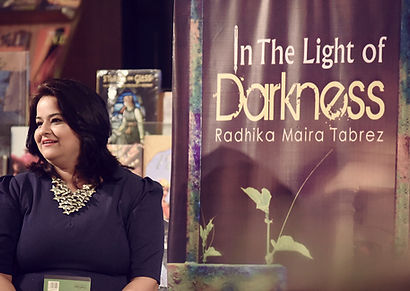The Freedom to be 'Us'
- radhika-maira-tabrez
- Sep 15, 2016
- 4 min read
The following piece was originally written for and published in ThnkMkt Magazine.
For as long as I can remember, we have been a country of pretty relaxed norms when it comes to conversations and interpersonal behaviour. A country where a neighbourhood Aunty can chastise you authoritatively, for your skirt being too short. Or your father’s colleague, whom you are meeting for the first time, feels comfortable enough to tell you that there is no scope in engineering-shengineering anymore; notwithstanding the fact that you’ve always wanted to be one. As outrageously intrusive this may sound; this license to say what we want, to whom we want, and when we want, is what makes us ‘us’. It is what connects us all as countrymen, in a way that the outsiders find oddly endearing. This is why we can crack Sardar/Gujju/Mallu or even sexists jokes with wanton abandon; even amidst a group of friends that is comprised of these people, knowing that it wouldn’t affect our friendship in the least. This is why our colleague can unabashedly poke holes in all our recipes in public and still expect to share a bite from our lunch every day.
Dissent has always been acceptable in India. In a country as diverse in languages, cultures, customs and religions as we are; nothing less would be expected to work anyway. But has this changed, lately? Is our freedom of expression as we know it under threat?
When I started to research for this article, I came across some startling facts. Facts that defied all that I had known to be true for India; all that I have sampled above. The problem as I realized, ran far graver than an occasional ban on a book or a protest over a movie. Turns out, freedom of expression in India, has always been hiding deep under the water and breathing through a hose.
The archaic laws and the first amendment have often been misused by the state to restrict the original sweeping freedom the constitution had granted to every citizen. The judicial system has been of no relief either. Lower courts are quick to decide against any artists or persons who have even remotely touched on a sensitive or a controversial subject. While the High Courts and Supreme Courts have always been more positive in dealing with such cases; going to them for help is long winding and expensive. To make matters worse, police and the politicians too, have historically sided with the troublemakers, rather than following the law in letter and spirit, and supporting the common citizens.
So this makes for an interesting conundrum. How, in a country with such an inconducive legal and political environment, did our social environment, learn to be this blasé in speech and behaviour? And, more importantly, if that is how relaxed we have always been, where is the current environment of repressive bowdlerization coming from?
Let’s not speak of the Kanhaiya Kumars and the Aamir Khans. Enough has been said on those subjects already. But how free or constricted does a common man’s expression feel? Is he comfortable in saying what he wants, without the fear of being ‘tagged with a label’ or ‘trolled’ or ‘harangued’? Or does he think twice before cracking a joke or sharing an opinion, for the fear of being called ‘intolerant’?
For a country like India, this understanding becomes even more important. Brazil and India, with the high number of internet users that they have, are often collectively called ‘swing states’; crucial in determining where the global conversation goes on the subject of ‘freedom of expression’. The Internet is the mega stage where all thought exchanges are happening. Where the new ideas are being developed and forged into the change agent which the world of tomorrow needs. Ironically, that is also the stage where ‘freedom of expression’ is most under threat. Perhaps, because the very nature of the medium puts every instance of dissent or a controversial expression, on record for posterity and available to a world audience.
All the legal arsenal, which is being used to muzzle the freedom of expression in India is not new. It has always been around and been abused to suit the innuendoes of the powerful few. The Indian Penal Code and the IT Act have been around for as long as they have. But the potency with which they are being employed now is new. Also, it is a very slippery slope.
Democracy is a government of the people, by the people, and for the people. Which means for the machinery of democracy to fail - like in this case, one of its fundamental rights and freedoms to be questioned - the fiasco must stem from the very masses, the people.
Let me elaborate using an example. A few years ago, a young girl said something regarding a prominent
politician’s death, on a social media site. She was soon after dragged away to the Police Station like a seasoned criminal. That’s not even the worst part. As she later said in an interview, what broke her spirit was the way she was berated and sermonized by thousands of people, with unwarranted belligerence and hatred. I don’t know if it is hypocritical or just plain sad, that in a country where politicians regularly resort to hate speeches and name-calling targeted at their opposition, a common citizen is treated as criminal for something as little as ‘liking’ or ‘commenting on’ a Facebook post. How does so much unjustifiable power land up in the hands of the police? It comes from all the people who unknowingly condone the police’s action of her unconstitutional arrest; by singling her out on the social media.
In our effort to ‘fit in’ with the current trends and often abusing the easy access to a global platform like social media; a lot of us speak up on issues we know very little of, and I doubt feel as strongly about. A little introspection and a quick reading of the constitution would remind us, that a lot of what is being muzzled these days, is well within the constitutional rights of a citizen of this country. And, more notably, also within our long established and perfectly acceptable social norms.
So, in conclusion - Yes. Our ‘freedom of expression’ is currently under threat in India. This time, from us.
That is both, the bad news-but thankfully-also the good.



















Comments